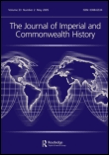
JOURNAL OF IMPERIAL AND COMMONWEALTH HISTORY
Scope & Guideline
Navigating the intersections of past and present in global contexts.
Introduction
Aims and Scopes
- Colonial and Postcolonial Studies:
The journal emphasizes the examination of colonial and postcolonial frameworks, analyzing how these historical contexts shape contemporary societies and identities. - Interdisciplinary Approaches:
Utilizing a wide range of methodologies, including historical, cultural, and social analysis, the journal integrates perspectives from various disciplines to enrich the understanding of imperial and commonwealth histories. - Global Connections and Transnational Perspectives:
The journal highlights the interconnectedness of empires and nations, focusing on transnational histories that reveal the complexities of global interactions during and after colonialism. - Cultural Representations and Memory:
Exploring how empires are represented in literature, art, and public memory, the journal investigates the narratives that shape collective identities and historical consciousness. - Gender and Identity in Imperial Contexts:
The journal addresses the roles of gender and identity within imperial frameworks, examining how these factors influence power dynamics and social structures.
Trending and Emerging
- Decolonization and Its Legacies:
Papers examining the processes and implications of decolonization are increasingly prominent, highlighting the ongoing impact of colonial histories on current global politics and identities. - Environmental History and Colonialism:
There is a growing interest in the environmental consequences of imperial activities, with studies investigating how colonial exploitation has shaped ecological landscapes and social relations. - Cultural Memory and Representation:
Emerging themes related to how societies remember and represent their colonial pasts are becoming more prevalent, focusing on narratives that challenge dominant historical perspectives. - Gender and Sexuality in Colonial Contexts:
Research focusing on gender and sexuality within the context of empire is on the rise, reflecting a broader societal interest in understanding how these identities intersect with colonial power dynamics. - Indigenous Perspectives and Voices:
There is an increasing emphasis on incorporating indigenous perspectives and narratives into the discourse of imperial history, acknowledging the importance of diverse voices in shaping historical understanding.
Declining or Waning
- Economic History of Colonialism:
There has been a noticeable decrease in papers specifically focused on the economic aspects of colonialism, suggesting a waning interest in traditional economic analyses in favor of broader sociocultural perspectives. - Military History and Strategy:
While military history remains important, it appears to be less frequently explored in recent publications, indicating a shift towards examining the social and cultural impacts of imperialism rather than purely military strategies. - Traditional National Histories:
The journal seems to be moving away from conventional national histories, favoring more nuanced and interconnected narratives that emphasize transnational and global contexts. - Focus on Early Colonial Periods:
There seems to be a decline in research centered on early colonial periods, with a growing emphasis on modern and contemporary issues related to empire and its legacies.
Similar Journals
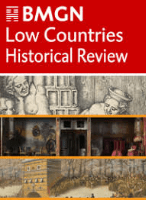
BMGN-The Low Countries Historical Review
Unveiling Diverse Perspectives on the Low Countries' PastBMGN-The Low Countries Historical Review, published by the KONINKLIJK NEDERLANDS HISTORISCH GENOOTSCHAP, is a distinguished open-access journal dedicated to the study of the history of the Low Countries, offering insights and diverse perspectives on historical developments from the region. With an ISSN of 0165-0505 and an E-ISSN of 2211-2898, this journal has been a valuable resource since its inception in 1970, with its rich archive covering pivotal years including 1975 and periods from 1999 to 2002, as well as the continuous series since 2009. With a notable impact factor supporting its reputation—scoring a commendable Q3 in History and achieving the 85th percentile rank within the Arts and Humanities category—BMGN is instrumental in fostering scholarly dialogue and advancing historical discourse. The journal's open-access format ensures broad access to its content, supporting researchers, professionals, and students keen to explore the intricate tapestry of Low Countries history. With its office located in The Hague, Netherlands, BMGN continues to be a pivotal forum for historical engagement and publication.

Anclajes
Bridging Theories and Cultures for Global UnderstandingAnclajes is a prominent academic journal dedicated to the fields of Cultural Studies, Linguistics, and Literature, published by the UNIV NACIONAL LA PAMPA, FAC CIENCIAS HUMANAS. With both print (ISSN 0329-3807) and electronic (E-ISSN 1851-4669) formats, the journal has embraced an Open Access model since 2010, greatly enhancing its accessibility and reach to a global audience. Based in Argentina, Anclajes provides a platform for innovative research and critical discourse, contributing significantly to the understanding of cultural phenomena and literary theories. In recent years, the journal has established itself with a Scopus rank placing it in the top 30% of Literature and Literary Theory and the top 57% of Cultural Studies, as indicated by its quartile rankings for 2023. With issues converging from 2012 to 2024, Anclajes continues to foster scholarly communication and serves as an essential resource for researchers, students, and professionals seeking to explore the dynamism of human culture and expression.
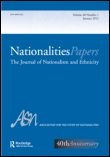
Nationalities Papers-The Journal of Nationalism and Ethnicity
Fostering Critical Dialogue on Cultural Identity and PoliticsNationalities Papers - The Journal of Nationalism and Ethnicity, published by Cambridge University Press, stands as a pivotal forum dedicated to exploring the intricate dynamics of nationalism, ethnicity, and cultural identity in a global context. With an impact factor in the upper echelons of academia, the journal is classified within the Q1 category for both History and Political Science and International Relations, and Q2 in Geography, Planning and Development as of 2023. This esteemed journal, originating in the United Kingdom, has a rich history since its inception in 1972, continuously evolving to address contemporary issues surrounding national identity and ethnic tensions. It ranks impressively among other publications in its fields, evidenced by its notable Scopus rankings in multiple disciplines. Researchers, professionals, and students alike benefit from the journal's rigorous peer-reviewed articles which not only enhance scholarly discourse but also provide actionable insights into real-world phenomena. While it operates under a traditional access model, the essential contributions made by Nationalities Papers ensure it remains a crucial resource for anyone engaging in the study of nationalism and ethnicity globally.
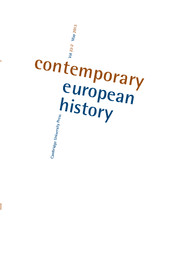
Contemporary European History
Illuminating the Complexities of Modern EuropeContemporary European History is a leading academic journal dedicated to the exploration of significant historical events across Europe from 1992 to the present, published by Cambridge University Press. As a Q1 rated journal in the field of History, it boasts a robust impact factor, reflecting its high citation frequency and prominence among scholars. The journal serves as an essential platform for researchers, professionals, and students interested in contemporary issues and trends affecting Europe, promoting interdisciplinary dialogue and the exchange of ideas. With its commitment to high-quality scholarship, Contemporary European History provides insightful analyses that shape our understanding of recent historical dynamics, making it a vital resource for anyone looking to delve into the complexities of modern European history.

INTERNATIONAL JOURNAL OF IBERIAN STUDIES
Bridging Cultures, Histories, and Politics of IberiaINTERNATIONAL JOURNAL OF IBERIAN STUDIES (ISSN 1364-971X; E-ISSN 1758-9150), published by INTELLECT LTD, stands as a pivotal forum for interdisciplinary research on the Iberian Peninsula, engaging with complex cultural, historical, and political narratives. Established in 2012, this journal highlights diverse perspectives and fosters scholarly dialogue within its scope bridging Cultural Studies, History, and Political Science, reflected in its 2023 Scopus rankings which place it within the Q3 and Q4 quartiles across various categories. Although currently not an open-access journal, it provides critical insights and original research essential for students, researchers, and professionals alike. The journal's commitment to exploring the multifaceted dimensions of Iberian studies makes it a significant contributor to the field, encouraging submissions that deepen understanding and promote scholarly excellence.

Cultural History
Decoding Cultural Phenomena Through Historical LensesCultural History, published by Edinburgh University Press, is a pivotal journal in the fields of cultural studies, history, and political science. With an ISSN of 2045-290X, this quarterly journal has been contributing to the academic landscape since its inception in 2012 and continues to serve as a vital platform for scholarly discourse through 2024 and beyond. Although it falls within the Q4 quartile of its respective categories, it boasts commendable rankings in the Scopus database, reflecting the growing interest and relevance of its research contributions, particularly in the realms of Arts and Humanities (Rank #444/1760) and Social Sciences (Rank #478/1304). Researchers, professionals, and students can engage with a wide array of articles that delve into diverse cultural phenomena, offering critical insights into historical contexts and contemporary implications. While the journal currently does not provide open access options, it remains an essential resource for those looking to deepen their understanding of the intricate relationships between culture, history, and political dynamics. For subscription or further inquiries, please contact The Tun-Holyrood Rd, 12 2F Jacksons Entry, Edinburgh EH8 8PJ, Scotland.

Contemporanea
Fostering Dialogue Across Time and BoundariesContemporanea is a distinguished academic journal dedicated to the exploration of contemporary history, published by SOC ED IL MULINO in Italy. Since its inception in 1999, this journal has served as a vital platform for scholars and researchers seeking to delve into the complex narratives that shape our modern world. With its ISSN 1127-3070 and E-ISSN 1127-3070, Contemporanea is indexed in Scopus, currently categorized in the third quartile (Q3) of the History category, ranking at #1012 out of 1760 and situated in the 42nd percentile, signifying its relevancy within the field. This journal not only promotes rigorous research but also fosters scholarly dialogue that transcends traditional boundaries. Researchers and students alike will find a treasure trove of articles that cover diverse themes, ensuring a comprehensive understanding of contemporary historical issues. While access options are not open, contributors and readers are encouraged to engage with the wealth of knowledge presented within its pages, contributing to the journal’s objective of advancing academic scholarship.
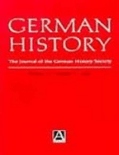
German History
Unveiling the Layers of German HeritageGerman History is a leading academic journal published by Oxford University Press, focusing on the rich and multifaceted history of Germany from the medieval period to contemporary times. With a strong emphasis on interdisciplinary approaches, this journal invites contributions that explore social, cultural, political, and economic aspects of German history. Established in 1984, and with comprehensive publication coverage from 1984 to 1994 and from 1996 to 2024, German History occupies a significant place in the historical field, currently ranked in the Q2 category as per the 2023 Scopus rankings. Although it does not offer open access options, the journal continues to uphold academic rigor and scholarly excellence, making it a crucial resource for researchers, professionals, and students engaged in the study of German history. With a commitment to fostering high-quality research and dialogue, German History remains an essential platform for critical discourse and groundbreaking scholarship in the field.

Istorija
Fostering Dialogue Through Historical InsightIstorija is a distinguished academic journal published by Vytautas Magnus University Education Academy, focusing on historical research and discourse. With its ISSN 1392-0456 and E-ISSN 2029-7181, the journal aims to disseminate high-quality scholarly articles that explore various facets of history, catering to an audience of researchers, educators, and students alike. Although currently not open access, Istorija remains committed to advancing historical scholarship by contributing valuable insights and fostering academic dialogue through an inclusive editorial process. Set against the backdrop of Vilnius, Lithuania, the journal engages with both regional and international historical narratives, making it a pivotal resource for those looking to deepen their understanding of historical events, methodologies, and interpretations. Whether you are a seasoned historian or a burgeoning scholar, Istorija offers a platform for the exploration and exchange of innovative ideas and research within the discipline.
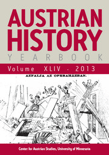
Austrian History Yearbook
Enriching Historical Discourse on Austria and BeyondAustrian History Yearbook is a leading academic journal published by Cambridge University Press, focusing on the rich tapestry of Austrian history and its intersections with broader European narratives. With its ISSN 0067-2378 and E-ISSN 1558-5255, the journal has carved a niche within the academic landscape since its inception, offering insightful research and analysis that spans various periods and themes in Austrian history. Rated in the Q2 category for History in 2023, and boasting a respectable Scopus rank of #564 out of 1760 within the Arts and Humanities field, the Austrian History Yearbook stands out as a vital resource for historians, researchers, and students alike. The journal aims to promote scholarly discourse, foster critical engagement with historical texts, and contribute significantly to the historiography of Austria and its role in European history. With access options providing a gateway to an extensive repository of scholarly works, the journal serves as an essential platform for advances in historical research, making it indispensable for a global audience keen on understanding the complexities of Austrian heritage.